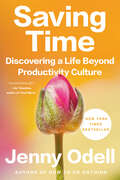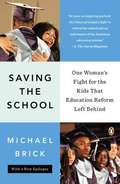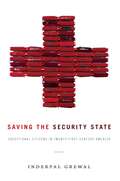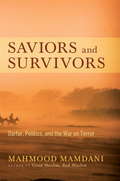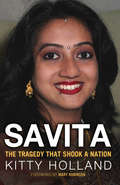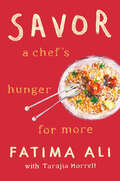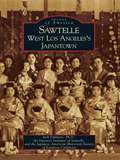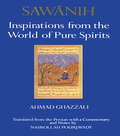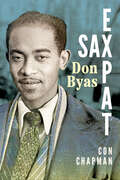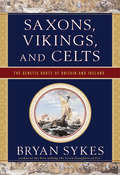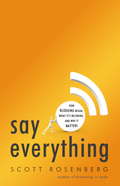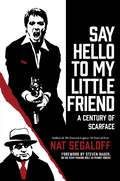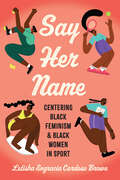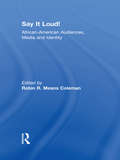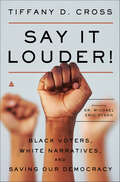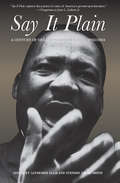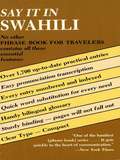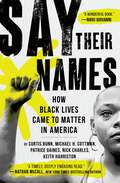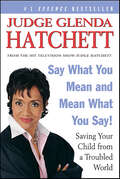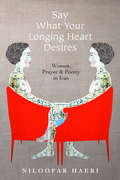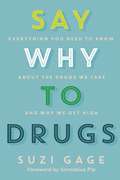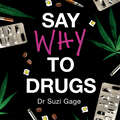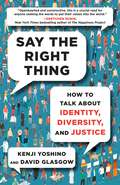- Table View
- List View
Saving Time: Discovering a Life Beyond the Clock
by Jenny OdellWe are living on the wrong clock, and it is destroying us. The New York Times bestselling author of How to Do Nothing offers us different ways to experience time in this dazzling, subversive, and deeply hopeful book. <p><p>In her first book, How to Do Nothing, Jenny Odell wrote about the importance of disconnecting from the “attention economy” to spend time in quiet contemplation. But what if you don’t have time to spend? <p><p>In order to answer this seemingly simple question, Odell took a deep dive into the fundamental structure of our society and found that the clock we live by was built for profit, not people. This is why our lives, even in leisure, have come to seem like a series of moments to be bought, sold, and processed ever more efficiently. Odell shows us how our painful relationship to time is inextricably connected not only to persisting social inequities but to the climate crisis, existential dread, and a lethal fatalism. <p><p>This dazzling, subversive, and deeply hopeful book offers us different ways to experience time—inspired by pre-industrial cultures, ecological cues, and geological timescales—that can bring within reach a more humane, responsive way of living. As planet-bound animals, we live inside shortening and lengthening days alongside gardens growing, birds migrating, and cliffs eroding; the stretchy quality of waiting and desire; the way the present may suddenly feel marbled with childhood memory; the slow but sure procession of a pregnancy; the time it takes to heal from injuries. Odell urges us to become stewards of these different rhythms of life in which time is not reducible to standardized units and instead forms the very medium of possibility. <p><p>Saving Time tugs at the seams of reality as we know it—the way we experience time itself—and rearranges it, imagining a world not centered on work, the office clock, or the profit motive. If we can “save” time by imagining a life, identity, and source of meaning outside these things, time might also save us. <p> <b>New York Times Bestseller</b>
Saving the School
by Michael BrickIn the race to save a failing public high school, one principal finds that making the numbers is only the beginning Being principal of Reagan High in Austin, Texas, was no dream assignment. Test scores were low, dropout rates were high, and poverty was endemic. But when Anabel Garza took the job, she started something no one expected. Racing against a deadline just to make the numbers, she set out to rebuild the kind of school that once unified neighborhoods across America. By her side, a basketball coach showed kids they could be winners, a young science teacher showed them they could learn, and a community rallied around a treasured institution. In this powerful rejoinder to the prevailing winds of education policy, Michael Brick takes readers inside the high-pressure world of a school on the brink. Paying overdue tribute to a vital American tradition—the great American high school—Saving the School exposes the flaws of a broken system but also tells an inspiring story of faith, hope, and perseverance. .
Saving the Security State: Exceptional Citizens in Twenty-First-Century America
by Inderpal GrewalIn Saving the Security State Inderpal Grewal traces the changing relations between the US state and its citizens in an era she calls advanced neoliberalism. Marked by the decline of US geopolitical power, endless war, and increasing surveillance, advanced neoliberalism militarizes everyday life while producing the “exceptional citizens”—primarily white Christian men who reinforce the security state as they claim responsibility for protecting the country from racialized others. Under advanced neoliberalism, Grewal shows, others in the United States strive to become exceptional by participating in humanitarian projects that compensate for the security state's inability to provide for the welfare of its citizens. In her analyses of microfinance programs in the global South, security moms, the murders at a Sikh temple in Wisconsin, and the post-9/11 crackdown on Muslim charities, Grewal exposes the fissures and contradictions at the heart of the US neoliberal empire and the centrality of race, gender, and religion to the securitized state.
Saviors and Survivors: Darfur, Politics, and the War on Terror
by Mahmood MamdaniThose who insist on seeing the horrific violence in Darfur as a conflict between "Arabs" and "Africans" and as a genocide are failing to look at the historical and political context of the violence and are serving to delay political reconciliation with their calls for military intervention and their emphasis on retributive justice. So argues Mamdani (anthropology and politics, Columbia U. ), who urges us to rethink key assumptions about traditions, race, tribe, and locality in Darfur in order to better understand the conflict and how to move towards political reconciliation and peace. He sets his discussion of these issues within the context of colonial and nationalist historiographies of Sudan and Darfur, seeking to debunk the simplistic understanding of the violence as a conflict between Arab settler rulers and African natives. He argues instead that the violence should be seen as product of a land tenure system that set different tribes interests' against one another, sometimes along an Arab/non-Arab axis and sometimes along an Arab/Arab axis. Annotation ©2010 Book News, Inc. , Portland, OR (booknews. com)
Savita: The Tragedy that shook a nation
by Kitty HollandSeventeen weeks pregnant and facing a miscarriage, Savita Halappanavar and her husband Praveen walked into an Irish maternity ward in October 2012. Unwittingly, the couple also walked into that deeply controversial arena in which Ireland’s legislative position on abortion remained unresolved.A week later, Savita was dead from septicaemia. Reports of her death and of the refusal to allow Savita a termination of her pregnancy sent shockwaves across Ireland and around the world. Once again the subject of abortion was catapulted to the very top of the agenda in Ireland. With the pro-life and pro-choice camps claiming the moral high ground, both sides in the bitterly contested battle sought to appropriate Savita’s story and her image. In the midst of the ensuing rage and furore, the marches and protests, the threats and counter-threats that exploded across political and media platforms, Savita and the complete circumstances of her death were lost. In Savita: The Tragedy That Shook A Nation, Kitty Holland addresses this imbalance as she reveals the truth behind the headlines and explores many unanswered questions: Who was Savita? How significant was it that she was a non-Irish, non-Catholic woman in search of help on Irish soil? And how did her husband and her community’s reaction to her death shape the parameters of the debate which followed? Holland’s exposé also looks at how the tragic circumstances of Savita’s death played a part in compelling the Irish Government to finally legislate on abortion and how activists on each side succeeded or failed in shaping that legislation.
Savor: A Chef's Hunger for More
by Fatima AliA young chef whose dreams were cut short savors every last minute as she explores food and adventure, illness and mortality in Savor, an &“inspiring&” (The New York Times Book Review) memoir and family story that sweeps from Pakistan to Manhattan and beyond. &“Ali&’s strength and passion for food and her culture shines through. . . . This memoir is a tribute to the extraordinary life and impact she made in twenty-nine years.&”—Oprah Daily (20 of the Best Fall Nonfiction Books of 2022)Fatima Ali won the hearts of viewers as the Fan Favorite of Bravo&’s Top Chef in season fifteen. Twenty-nine years old, she was a dynamic, boundary-breaking chef and a bright new voice for change in the food world. After the taping wrapped and before the show aired, Fati was diagnosed with a rare form of bone cancer. Not one to ever slow down or admit defeat, the star chef vowed to spend her final year traveling the world, eating delicious food, and making memories with her loved ones. But when her condition abruptly worsened, her plans were sidelined. She pivoted, determined to make her final days count as she worked to tell the story of a brown girl chef who set out to make a name for herself, her food, and her culture. Including writing from Fatima during her last months and contributions by her mother, Farezeh, and her collaborator, Tarajia Morrell, Savor is a deftly woven account and an inspiring ode to the food, family, and countries Fatima loved so much. Alternating between past and present, readers are transported back to Pakistan and the childhoods of both Fatima and Farezeh, each deeply affected by cultural barriers that shaped the course of their lives. From the rustic stalls of the outdoor markets of Karachi to the kitchen and dining room of Meadowood, the acclaimed three-star Michelin restaurant where she apprenticed, Fati reflects on her life and her identity as a chef, a daughter, and a queer woman butting up against traditional views. Savor is a triumphant memoir, at once an exploration of the sense of wonder that made Fatima so special and a shining testament to the resilience of the human spirit. At its core, it is a story about what it means to truly live, a profound and exquisite portrait of savoring every moment.
Savoring Alternative Food: School gardens, healthy eating and visceral difference (Routledge Studies in Food, Society and the Environment)
by Jessica Hayes-ConroyAdvocates of the alternative food movement often insist that food is our "common ground" – that through the very basic human need to eat, we all become entwined in a network of mutual solidarity. In this challenging book, the author explores the contradictions and shortcomings of alternative food activism by examining specific endeavours of the movement through various lenses of social difference – including class, race, gender, and age. While the solidarity adage has inspired many, it is shown that this has also had the unfortunate effect of promoting sameness over difference, eschewing inequities in an effort to focus on being "together at the table". The author explores questions of who belongs at the table of alternative food, and who gets to decide what is eaten there; and what is at stake when alternative food practices become the model for what is right to eat? Case studies are presented based on fieldwork in two distinct loci of alternative food organizing: school gardens and slow food movements in Berkeley, California and rural Nova Scotia. The stories take social difference as a starting point, but they also focus specifically on the complexities of sensory experience – how material bodies take up social difference, both confirming and disrupting it, in the visceral processes of eating. Overall the book demonstrates the importance of moving beyond a promotion of universal "shoulds" of eating, and towards a practice of food activism that is more sensitive to issues of social and material difference.
Sawtelle: West Los Angeles's Japantown (Images of America)
by Japanese American Historical Society of Southern California Jack Fujimoto Japanese Institute of SawtelleA 1.48-square-mile piece of unincorporated Los Angeles County when it was annexed by the City of Los Angeles in 1922, tiny Sawtelle has lived very large in the hearts and minds of Japanese Americans. Their homes, livelihoods, religions, businesses, language, and other ethnocentric and social involvements are rooted in the area, with the Japanese Institute of Sawtelle as the cultural nexus. Bisected by Sawtelle Boulevard, this particular Japantown flourished through a close-knit network of immigrants who were denied citizenship until 1952 and were excluded by law from land ownership. Only through second-generation, American-born children could they buy real property. These vintage images--collected from local families, businesses, and organizations--provide rare glimpses into the Japanese immigrant experience in Los Angeles.
Sawānih: Inspirations from the World of Pure Spirits
by Ahmed GhazzaliFirst published in 1986. The present volume is a complete translation of the Sawanih, written by the Persian Sufi master Ahmad Ghazzali with a commentary by the translator. The title of this book, to Sufis, means the inspirations that a mystic experiences on his journey through the world of the Spirit (c?lam-i r?h) or, as it is sometimes called, the world of Pure Spirits (c?lam-i arwah).
Sax Expat: Don Byas (American Made Music Series)
by Con ChapmanDon Byas (1913–1972) may be lesser known than the counterparts he played with—Count Basie, Duke Ellington, and Dizzy Gillespie, among others—but he was an enigma. He never stayed with a band for long, and eventually went solo partly to make more money and partly due to his inability to work with bandleaders. Often drinking to excess, alcohol fueled his sometimes-erratic behavior on and off the bandstand. He went through at least thirteen different groups in fifteen years of professional play before leaving for Europe in 1946. Despite his fractious personality, in Europe he found peace and contentment as a family man in the Netherlands, where he lived out his days with his second wife and their four children. He learned at least seven languages during his years in Europe, and on traveling to a new country could pick up a few phrases in short order, soon speaking to the locals and even composing songs in their native tongue. In Sax Expat: Don Byas, author Con Chapman argues that Byas’s relative obscurity arises from his choice to live in Europe, where he missed out on recording opportunities and exposure in the US that would have made him renowned and wealthier. His numerous achievements, including his solo on Count Basie’s “Harvard Blues,” which is a model of restrained invention; his interpretation of the sentimental movie theme “Laura”; and his duets with bassist Slam Stewart were included in the Smithsonian Collection of Classic Jazz and secured Byas’s place in jazz history. This biography brings to life an amazing jazz story.
Saxons, Vikings, and Celts: The Genetic Roots of Britain and Ireland
by Bryan SykesFrom the best-selling author of The Seven Daughters of Eve, a perfect book for anyone interested in the genetic history of Britain, Ireland, and America. One of the world's leading geneticists, Bryan Sykes has helped thousands find their ancestry in the British Isles. Saxons, Vikings, and Celts, which resulted from a systematic ten-year DNA survey of more than 10,000 volunteers, traces the true genetic makeup of the British Isles and its descendants, taking readers from the Pontnewydd cave in North Wales to the resting place of the Red Lady of Paviland and the tomb of King Arthur. This illuminating guide provides a much-needed introduction to the genetic history of the people of the British Isles and their descendants throughout the world.
Say Everything: How Blogging Began, What It's Becoming, and Why It Matters
by Scott RosenbergBlogs are everywhere. They have exposed truths and spread rumors. Made and lost fortunes. Brought couples together and torn them apart. Toppled cabinet members and sparked grassroots movements. Immediate, intimate, and influential, they have put the power of personal publishing into everyone’s hands. Regularly dismissed as trivial and ephemeral, they have proved that they are here to stay.In Say Everything, Scott Rosenberg chronicles blogging’s unplanned rise and improbable triumph, tracing its impact on politics, business, the media, and our personal lives. He offers close-ups of innovators such as Blogger founder Evan Williams, investigative journalist Josh Marshall, exhibitionist diarist Justin Hall, software visionary Dave Winer, "mommyblogger" Heather Armstrong, and many others. These blogging pioneers were the first to face new dilemmas that have become common in the era of Google and Facebook, and their stories offer vital insights and warnings as we navigate the future. How much of our lives should we reveal on the Web? Is anonymity a boon or a curse? Which voices can we trust? What does authenticity look like on a stage where millions are fighting for attention, yet most only write for a handful? And what happens to our culture now that everyone can say everything?Before blogs, it was easy to believe that the Web would grow up to be a clickable TV–slick, passive, mass-market. Instead, blogging brought the Web’s native character into focus–convivial, expressive, democratic. Far from being pajama-clad loners, bloggers have become the curators of our collective experience, testing out their ideas in front of a crowd and linking people in ways that broadcasts can’t match. Blogs have created a new kind of public sphere–one in which we can think out loud together. And now that we have begun, Rosenberg writes, it is impossible to imagine us stopping.In his first book, Dreaming in Code, Scott Rosenberg brilliantly explored the art of creating software ("the first true successor to The Soul of a New Machine," wrote James Fallows in The Atlantic). In Say Everything, Rosenberg brings the same perceptive eye to the blogosphere, capturing as no one else has the birth of a new medium.
Say Hello to My Little Friend: A Century of Scarface
by Nat SegaloffThe author of The Exorcist Legacy: 50 Years of Fear, brings us another sensational Hollywood tell-all celebrating the 40th anniversary of Brian De Palma&’s legendary 1983 gangster film, while also showcasing its broader appeal across the past century by confronting the equally controversial legacy of its 1932 predecessor. When Brian DePalma&’s operatically violent Scarface debuted in 1983, the film drew almost as much fire as the relentless gunfire in the film itself. Starring Al Pacino as Cuban refugee-turned-crime-boss Tony Montana, Steven Bauer as his best friend Manny, and Michelle Pfeiffer as an Eighties gangster&’s moll, the movie revamped the original 1932 film for a new era of drugs, sex, and graphic violence. Attacked as both a celebration of cocaine-fueled excess and a condemnation of it, the film&’s reputation continued to rise over the years. But the real story of its success started nearly a century ago—when Hollywood first fell in love with the American gangster . . . Hollywood&’s infatuation with money, power, and organized crime has captured the public&’s imagination and made Scarface one of its most enduring modern myths. From a 1912 gangster film by D.W. Griffith to the 1932 hit Scarface starring Paul Muni, to Brian DePalma&’s 1983 shocker, the antihero&’s rise and fall exposes the dark side of the American Dream—whether it&’s Prohibition Era bootleggers or modern-day drug dealers. When actor Al Pacino got the idea of doing a remake of Scarface after screening the original, a legend was (re)born—and the rest is history. Filled with behind-the-scenes anecdotes, untold tales from Old and New Hollywood, and sixteen pages of eye-popping photos, Say Hello to My Little Friend is the ultimate guide to everything Scarface. With guns blazing and chainsaws whirring, movie biz writer Nat Segaloff tears into this pop culture phenomenon with fascinating insights, stunning revelations, and a true fan&’s glee. This is a must-have book for movie buffs, crime lovers, and culture vultures everywhere.
Say Her Name: Centering Black Feminism and Black Women in Sport (Critical Issues in Sport and Society)
by Letisha Engracia BrownSay Her Name: Centering Black Feminism and Black Women in Sports offers an in-depth look into the lived experiences of Blackgirlwomen as athletes, activists, and everyday people through a Black feminist lens. With so much research on race centered on Black men and gender research focusing on white women, Say Her Name offers a necessary conversation that places Blackgirlwomen at the center of discussion. Say Her Name delves deeply into issues of gender, the politics of punishment, athlete activism, the politics of Black hair, fingernails and fashion, and the representation and commodification of Blackgirlwomen in sport and society. An entry point into the growing research in sport studies and beyond from a Black feminist lens, Say Her Name offers a clear window into the power and potential of nuanced examinations of sport. As a reflection of the larger social world, sport provides a framework for understanding larger social issues, including racism, sexism, and misogynoir. Blackgirlwomen have varied experiences in sport, and Say Her Name provides a window into those experiences. The book discusses Black women in sports including the South African runner Caster Semenya and the American runners Florence Griffith Joyner and Sha’Carri Richardson, as well as Venus and Serena Williams, Gabby Douglas, and Simone Biles. The women in this book have lived experiences that speak to the larger experiences of Black women and girls in sport and society, while also leaning into a larger discussion of the importance of the social movement #SayHerName.
Say It Loud!: African American Audiences, Media and Identity
by Robin R. Means ColemanIn a collection of essays based on direct interview research, Say it Loud! amplifies the voice of ordinary African-Americans as they respond to media presentations of Black society. Each chapter investigates ways in which African-American identity is constructed, maintained, and represented in mass media and how these portrayals are interpreted within the African-American community. Together the essays cover a vast array of media messages in television, film, music, print and cyberspace. From the Boondocks comic strip, The Cosby Show, and The Color Purple to the music of rap artist DMX and original testimony from a Menace II Society copycat killer, the material included in this volume is examined as context for the African-American struggle to achieve definition, meaning, and power. Say it Loud! offers rare insight into how this struggle is both helped and hindered by the representation of race in our media culture.
Say It Louder!: Black Voters, White Narratives, and Saving Our Democracy
by Tiffany CrossA breakout media and political analyst delivers a sweeping snapshot of American Democracy and the role that African Americans have played in its shaping while offering concrete information to help harness the electoral power of the country’s rising majority and exposing political forces aligned to subvert and suppress Black voters.Black voters were critical to the Democrats’ 2018 blue wave. In fact, 90 percent of Black voters supported Democratic House candidates, compared to just 53 percent of all voters. Despite media narratives, this was not a fluke. Throughout U.S. history, Black people have played a crucial role in the shaping of the American experiment. Yet still, this powerful voting bloc is often dismissed as some “amorphous” deviation, argues Tiffany Cross.Say It Louder! is her explosive examination of how America’s composition was designed to exclude Black voters, but paradoxically would likely cease to exist without them. With multiple tentacles stretching into the cable news echo chamber, campaign leadership, and Black voter data, Cross creates a wrinkle in time with a reflective look at the timeless efforts endlessly attempting to deny people of color the right to vote—a basic tenet of American democracy. And yet as the demographics of the country are changing, so too is the electoral power construct—by evolution and by force, Cross declares. Grounded in the most-up-to-date research, Say It Louder! is a vital tool for a wide swath of constituencies.
Say It Plain: A Century of Great African American Speeches
by Booker T. Washington Jesse Jackson Clarence Thomas John Hope Franklin Julian Bond Martin Luther King Jr. Lani Guinier Howard Thurman Randall Robinson Stokely Carmichael Fannie Lou Hamer Joseph Lowery Dick Gregory Marcus Garvey Walter White Barbara Jordan Shirley Chisholm Thurgood Marshall Mary McLeod Bethune Charles Hamilton Houston Benjamin L. Hooks Louis Farrakhan Johnetta B. ColeA moving portrait of how black Americans have spoken out against injustice—with speeches by Thurgood Marshall, Shirley Chisholm, Jesse Jackson, and more. In &“full-throated public oratory, the kind that can stir the soul&”, this unique anthology collects the transcribed speeches of the twentieth century&’s leading African American cultural, literary, and political figures, many never before available in printed form (Minneapolis Star-Tribune). From an 1895 speech by Booker T. Washington to Julian Bond&’s sharp assessment of school segregation on the fiftieth anniversary of Brown v. Board in 2004, the collection captures a powerful tradition of oratory—by political activists, civil rights organizers, celebrities, and religious leaders—going back more than a century. Including the text of each speech with an introduction placing it in historical context, Say It Plain is a remarkable record—from the back-to-Africa movement to the civil rights era and the rise of black nationalism and beyond—conveying a struggle for freedom and a challenge to America to live up to its democratic principles. Includes speeches by: Mary McLeod BethuneJulian BondStokely CarmichaelShirley ChisholmLouis FarrakhanMarcus GarveyJesse JacksonMartin Luther King Jr.Thurgood MarshallBooker T. WashingtonWalter White
Say It in Swahili (Dover Language Guides Say It Series)
by DoverContains over 1,000 useful sentences and phrases for travel or everyday living abroad: food, shopping, medical aid, courtesy, hotels, travel, and other situations. Gives the English phrase, the foreign equivalent, and a transliteration that can be read right off. Also includes many supplementary lists, signs, and aids. All words are indexed.
Say Their Names: How Black Lives Came to Matter in America
by Patrice Gaines Curtis Bunn Michael H. Cottman Nick Charles Keith HarristonAn incisive, gripping exploration of the forces that pushed our unjust system to its breaking point after the death of George Floyd and a definitive guide to America's present-day racial reckoning. For many, the story of the weeks of protests in the summer of 2020 began with the horrific eight minutes and 46 seconds when Police Officer Derek Chauvin killed George Floyd on camera, and it ended with the sweeping federal, state, and intrapersonal changes that followed. It is a simple story, wherein white America finally witnessed enough brutality to move their collective consciousness. The only problem is that it isn't true. George Floyd was not the first Black man to be killed by police—he wasn&’t even the first to inspire nation-wide protests—yet his death came at a time when America was already at a tipping point. In SAY THEIR NAMES, five seasoned journalists probe this critical shift. With a piercing examination of how inequality has been propagated throughout history, from Black imprisonment and the Convict Leasing program to long-standing predatory medical practices to over-policing, the authors highlight the disparities that have long characterized the dangers of being Black in America. They examine the many moderate attempts to counteract these inequalities, from the modern Civil Rights movement to Ferguson, and how the killings of George Floyd, Breonna Taylor and others pushed compliance with an unjust system to its breaking point. Finally, they outline the momentous changes that have resulted from this movement, while at the same time proposing necessary next steps to move forward. With a combination of penetrating, focused journalism and affecting personal insight, the authors bring together their collective years of reporting, creating a cohesive and comprehensive understanding of racial inequality in America.
Say What You Mean and Mean What You Say!: Saving Your Child from a Troubled World
by Daniel Paisner Glenda HatchettParents have it tough. Kids have it tough, too. And few people are in a better position to guide readers through these tough times than Judge Glenda Hatchett. As chief presiding judge of one of the largest juvenile court systems in the country, she gained a front-row perspective on the hot-button social issues of our time -- including drug and alcohol abuse, truancy, date rape, and school violence. As presiding judge on the hit television series Judge Hatchett, she continues to build bridges between parents and their lost, angry, and alienated teens. And, as a parent, she's turned her professional experiences to personal advantage, helping her own children navigate through some of the more difficult dilemmas facing young people today.Using her experiences as a judge and a parent, Judge Hatchett shares with readers seven simple strategies to becoming more involved in a child's life and maintaining a strong relationship. Including concrete examples and illuminating anecdotes, Judge Hatchett says what she means and means what she says in this essential guide to raising safe, smart, and successful children ... even in the tough times.
Say What Your Longing Heart Desires: Women, Prayer, and Poetry in Iran
by Niloofar HaeriFollowing the 1979 revolution, the Iranian government set out to Islamize society. Muslim piety had to be visible, in personal appearance and in action. Iranians were told to pray, fast, and attend mosques to be true Muslims. The revolution turned questions of what it means to be a true Muslim into a matter of public debate, taken up widely outside the exclusive realm of male clerics and intellectuals. Say What Your Longing Heart Desires offers an elegant ethnography of these debates among a group of educated, middle-class women whose voices are often muted in studies of Islam. Niloofar Haeri follows them in their daily lives as they engage with the classical poetry of Rumi, Hafez, and Saadi, illuminating a long-standing mutual inspiration between prayer and poetry. She recounts how different forms of prayer may transform into dialogues with God, and, in turn, Haeri illuminates the ways in which believers draw on prayer and ritual acts as the emotional and intellectual material through which they think, deliberate, and debate.
Say Why to Drugs: Everything You Need to Know About the Drugs We Take and Why We Get High
by Dr Suzi Gage'Essential' Adam Rutherford, bestselling author of How to Argue With a Racist'In an area where factual accuracy is often rejected in favour of moralising or panicking this book is a vitally useful and frequently fascinating' Robin Ince__________Drugs. We've all done them. Whether it's a cup of coffee or a glass of wine, a cigarette or a sleeping pill. But how well do we understand the effects of the drugs we take - legal or illegal?Say Why to Drugs investigates the science behind recreational drugs- debunking common myths and misconceptions, as well as containing the most recent scientific research. Looking at a range of drugs, this book provides a clear understanding of how drugs work and what they're really doing to your mind and body.Along the way you will find out why ketamine is on the WHO's list of essential medicines, why some researchers hope MDMA could treat PTSD, and much more.Enlightening, entertaining, and thought-provoking, Say Why to Drugs is a compelling read that will surprise and educate proponents on both sides of the drugs debate.__________A definitive and authoritative guide to drugs and why we get high from the creator of the top-rated podcast, Say Why to Drugs.
Say Why to Drugs: Everything You Need to Know About the Drugs We Take and Why We Get High
by Dr Suzi GageA definitive and authoritative guide to drugs and why we get high from the creator of the top-rated podcast, Say Why to Drugs.Drugs. We've all done them. Whether it's a cup of coffee or a glass of wine, a cigarette or a sleeping pill. But how well do we understand the effects of the drugs we take - legal or illegal?Say Why to Drugs investigates the science behind recreational drugs- debunking common myths and misconceptions, as well as containing the most recent scientific research. Looking at a range of drugs, this book provides a clear understanding of how drugs work and what they're really doing to your mind and body. Along the way you will find out why ketamine is on the WHO's list of essential medicines, why some researchers hope MDMA could treat PTSD, and much more.Enlightening, entertaining, and thought-provoking, Say Why to Drugs is a compelling read that will surprise and educate proponents on both sides of the drugs debate.(P)2020 Hodder & Stoughton Limited
Say Why to Drugs: Everything You Need to Know About the Drugs We Take and Why We Get High
by Suzi Gage'Essential' Adam Rutherford, bestselling author of How to Argue With a Racist'In an area where factual accuracy is often rejected in favour of moralising or panicking this book is a vitally useful and frequently fascinating' Robin Ince__________Drugs. We've all done them. Whether it's a cup of coffee or a glass of wine, a cigarette or a sleeping pill. But how well do we understand the effects of the drugs we take - legal or illegal?Say Why to Drugs investigates the science behind recreational drugs- debunking common myths and misconceptions, as well as containing the most recent scientific research. Looking at a range of drugs, this book provides a clear understanding of how drugs work and what they're really doing to your mind and body.Along the way you will find out why ketamine is on the WHO's list of essential medicines, why some researchers hope MDMA could treat PTSD, and much more.Enlightening, entertaining, and thought-provoking, Say Why to Drugs is a compelling read that will surprise and educate proponents on both sides of the drugs debate.__________A definitive and authoritative guide to drugs and why we get high from the creator of the top-rated podcast, Say Why to Drugs.
Say the Right Thing: How to Talk About Identity, Diversity, and Justice
by Kenji Yoshino David GlasgowA Living Now Book Awards Gold Medalist, Social Activism/Charity A practical, shame-free guide for navigating conversations across our differences at a time of rapid social change.In the current period of social and political unrest, conversations about identity are becoming more frequent and more difficult. On subjects like critical race theory, gender equity in the workplace, and LGBTQ-inclusive classrooms, many of us are understandably fearful of saying the wrong thing. That fear can sometimes prevent us from speaking up at all, depriving people from marginalized groups of support and stalling progress toward a more just and inclusive society. Kenji Yoshino and David Glasgow, founders of the Meltzer Center for Diversity, Inclusion, and Belonging at NYU School of Law, are here to show potential allies that these conversations don&’t have to be so overwhelming. Through stories drawn from contexts as varied as social media posts, dinner party conversations, and workplace disputes, they offer seven user-friendly principles that teach skills such as how to avoid common conversational pitfalls, engage in respectful disagreement, offer authentic apologies, and better support people in our lives who experience bias. Research-backed, accessible, and uplifting, Say the Right Thing charts a pathway out of cancel culture toward more meaningful and empathetic dialogue on issues of identity. It also gives us the practical tools to do good in our spheres of influence. Whether managing diverse teams at work, navigating issues of inclusion at college, or challenging biased comments at a family barbecue, Yoshino and Glasgow help us move from unconsciously hurting people to consciously helping them.
